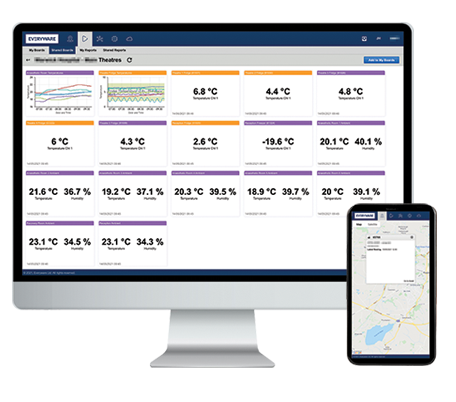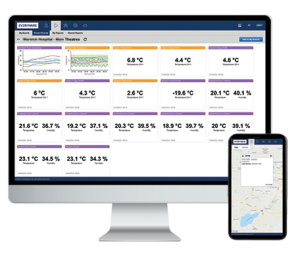Across the UK, hospital pharmacy departments are struggling to maintain quality control over drugs stored on wards. Central pharmacies have improved their compliance through automated temperature monitoring; however, the same can’t generally be said for wards.
Many NHS trusts rely on manual temperature tracking using data loggers, with nursing staff recording data on sheets once or twice daily. Some trusts have reported that this data is recorded effectively as little as twenty-five per cent of the time, with errors often noted within the data that’s been recorded. This is likely due to nursing staff being overstretched, navigating increased workloads and fewer resources, which can result in tasks seen as less important than direct patient care being pushed down the list of priorities.
This leads to temperature breaches being managed ineffectively. Valuable medicines are, therefore, being destroyed due to a lack of evidence of temperature compliance. Automated temperature monitoring for medicine stored in ward fridges or rooms provides an ideal solution to this challenge.
However, the real challenge isn’t the absence of a solution, but in securing funding to implement the widespread automated temperature monitoring required. We propose a collaborative approach to overcome this hurdle: we encourage pharmacy departments to work with other hospital departments facing similar operational challenges.
For context, over the past decade, we’ve seen an increase in how much hospitals rely on WiFi. Originally designed for sending and receiving data, hospital WiFi infrastructures have had to evolve rapidly to accommodate voice communication and later adapt to support asset tracking. The latter incurred substantial expenses, including the addition of more WiFi access points and the procurement of asset tracking licenses, which alone can cost between £50,000 and £75,000 annually.
To justify these investments, IT Directors and Chief Information Officers (CIOs) needed to create business cases that demonstrated a return on investment. These business cases often included acquiring asset tracking devices and software for medical devices.
This is where an opportunity is available to pharmacy departments. The EVERYWARE digital platform leverages WiFi technology to identify the location of fridges and record temperature data. By submitting a joint business case as a provider of both asset tracking and automated temperature monitoring, pharmacy departments can align their needs with broader hospital initiatives, making a compelling case for the allocation of funds.
The integration of automated temperature monitoring is essential to ensure safe and compliant medication storage. By collaborating with other departments and framing the proposal within the context of broader hospital WiFi initiatives, pharmacy departments can strengthen their business case, paving the way for improved patient care and operational efficiency.
To find out more about our asset monitoring technology and cloud-based platform, as well as to discuss working together to create an effective business case, please email contact us.


